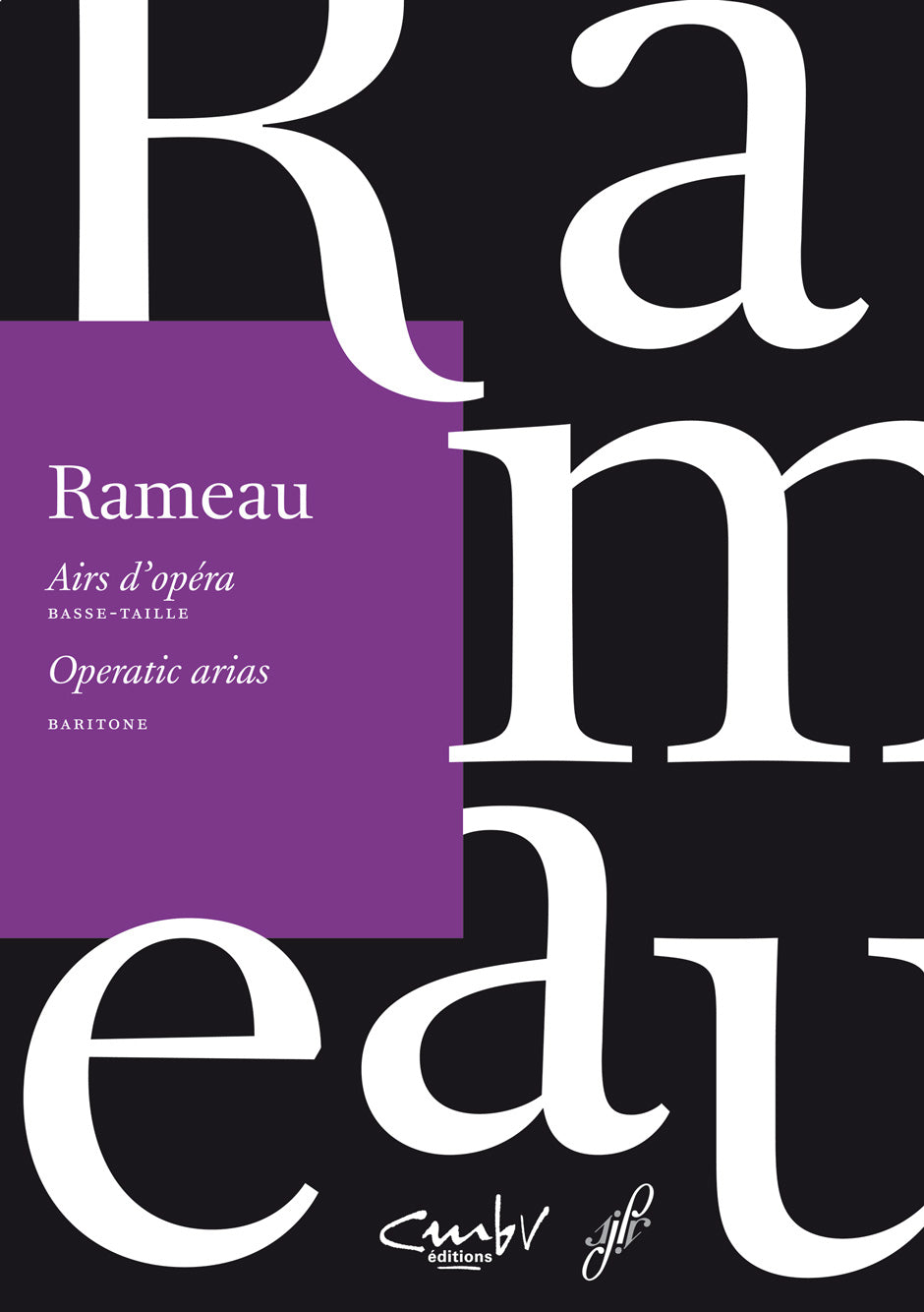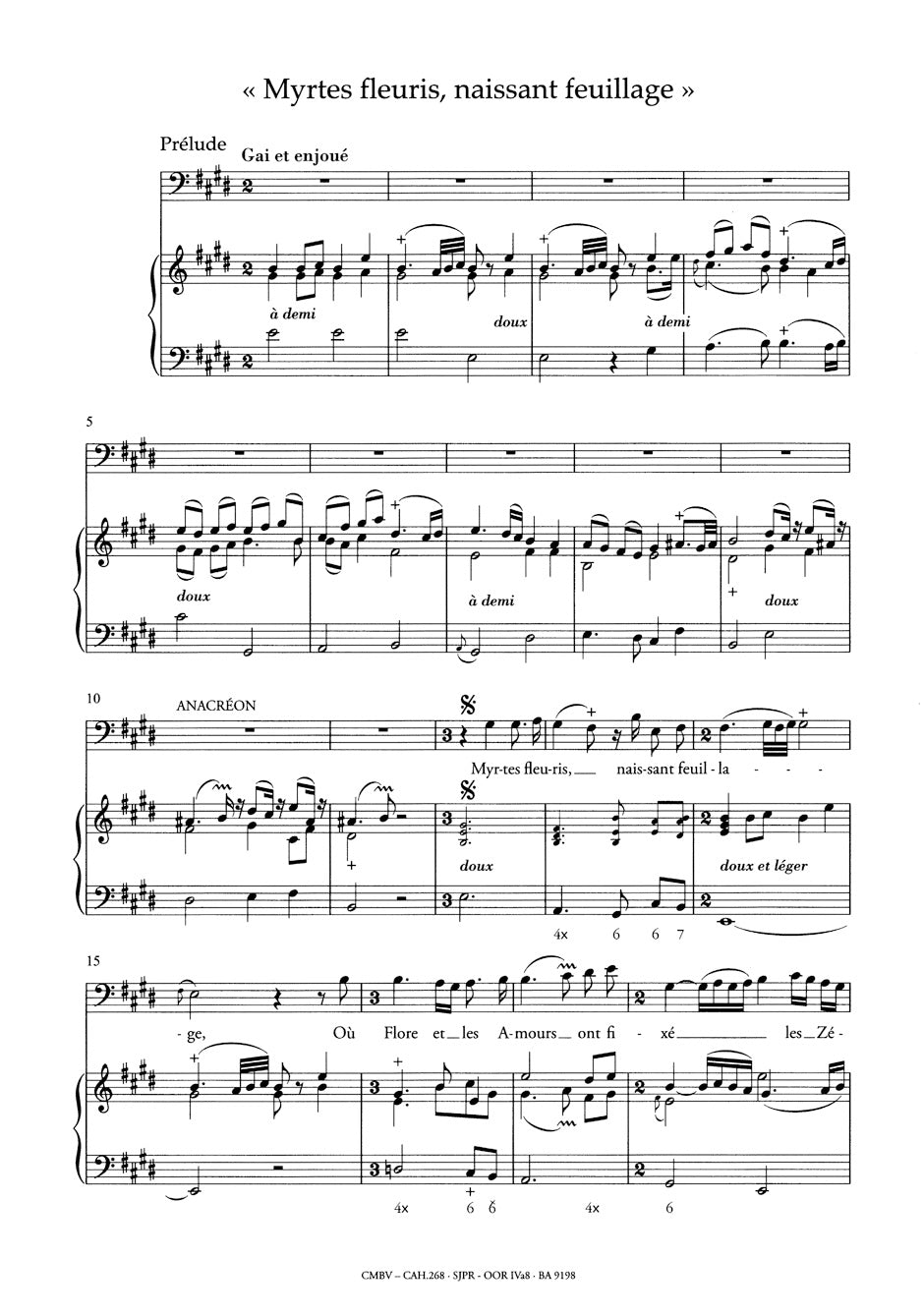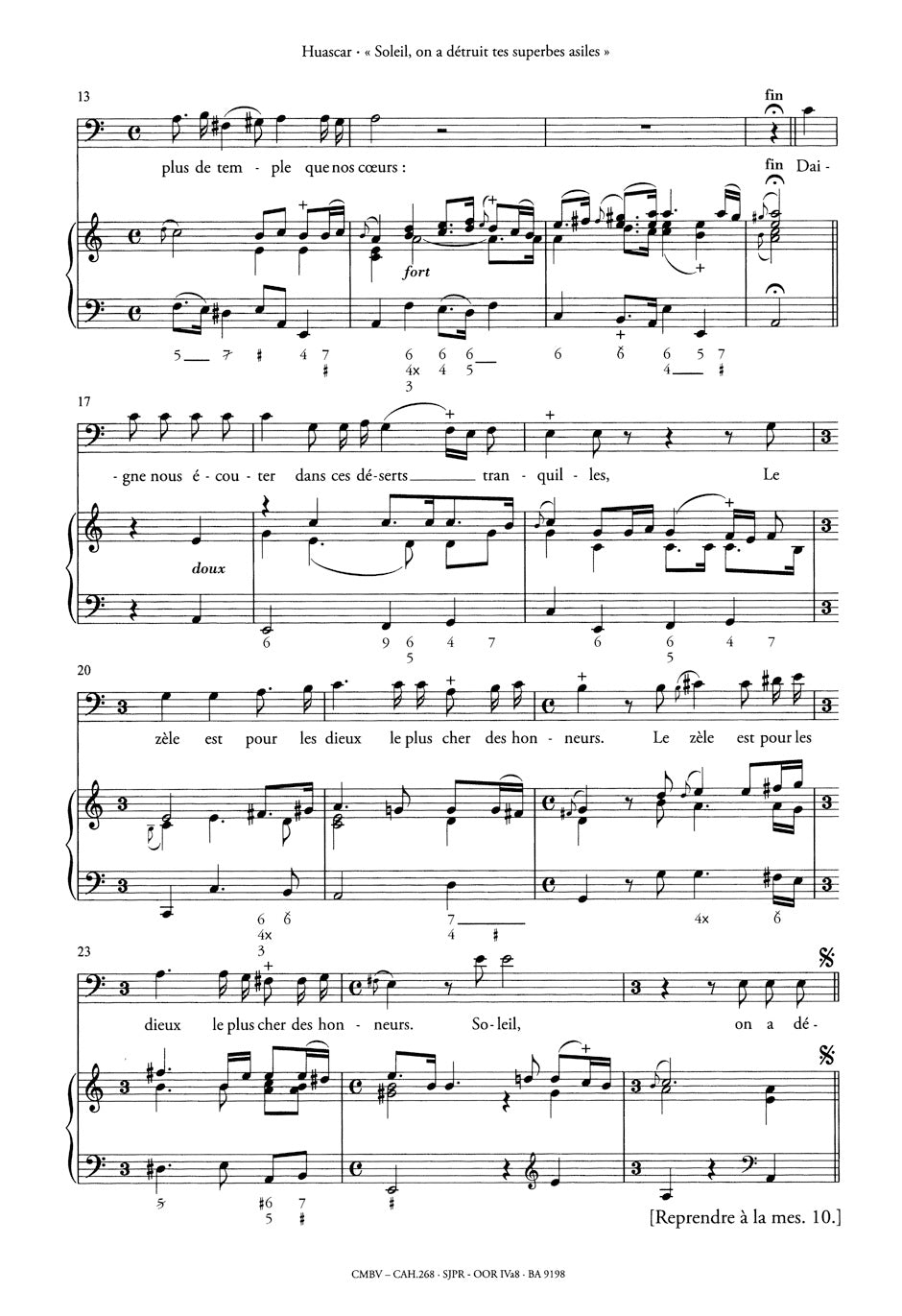Rameau: Operatic Arias - Baritone
In stock and typically ships within 1 business day.
- Composer: Jean-Philippe Rameau (1683-1764)
- Format: Vocal Score
- Instrumentation: Piano Reduction, Baritone
- Work Language: French
- ISMN:
- Size: 8.3 x 11.7 inches
- Pages: 146
- Urtext / Critical Edition
Description
This edition contains the great monologues, arias and ariettas that Rameau wrote for basse-taille (the 18th-century equivalent of today's baritone). The volume, which contains a historical Introduction in German and English, is based on the critical edition of the works "Opera omnia" Rameau (OOR). A short description of the dramatic situation and an English translation of the vocal text precede each number.
The volume contains the baritone arias for the main characters from the following operas:
Anacréon (Anacréon) Castor et Pollux (Pollux) Dardanus (Anténor) Les Fêtes de Polymnie (Zimès) Hippolyte et Aricie (Thésée) Les Indes galantes (Bellone, Huascar, Adario) Naïs (Tirésie) La Naissance d'Osiris (le grand Prêtre) Nélée et Myrthis (Nélée) Les Paladins (Orcan, Anselme) La Princesse de Navarre (un Français) Les Surprises de l'amour (Anacréon, Astole) Le Temple de la Gloire (l'Envie) Zoroastre (Abramane)
Contents:
- Introduction (français)
- Introduction (English)
- Anacréon. Livret de Cahusac:
- Anacréon: "Myrtes fleuris, naissant feuillage"
- Anacréon: "Des caprices du sort je crains peu les retours"
- Castor et Pollux. Livret de Gentil-Bernard:
- Pollux: "Nature, Amour, qui partagez mon coeur"
- Pollux: "Présent des dieux, doux charme des humains"
- Dardanus. Livret de Leclerc de La Bruère:
- Anténor: "Monstre affreux, monstre redoutable"
- Les Fêtes de Polymnie. Livret de Cahusac:
- La Féerie. Zimès: "Ne pourrai-je calmer le trouble qui me presse?"
- Hippolyte et Aricie. Livret de Pellegrin:
- Thésée: "Puisque Pluto est inflexible"
- Thésée: "Puissant maître des flots, favorable Neptune"
- Les Indes galantes. Livret de Fuzelier:
- Prologue. Bellone: "C'est la gloire qui rend les héros immortels"
- Les Incas du Pérou. Huascar: "Soleil, on a détruit tes superbes asiles"
- Les Sauvages. Adario: "Rivaux de mes exploits, rivaux de mes amours"
- Naïs. Livret de Cahusac:
- Tirésie: "Venez tous, venez apprendre"
- Tirésie: "Tout semble s'animer sur ce naissant feuillage"
- La Naissance d'Osiris. Livret de Cahusac:
- Le grand Prêtre de Jupiter: "La flamme des éclairs, les éclats du tonnerre"
- Nélée et Myrthis. Livret de Cahusac (?):
- Nélée: "Un torrent qui roule ses eaux"
- Les Paladins. Livret de Duplat de Monticourt:
- Orcan: "Je puis donc me venger moi-même"
- Anselme: "Tu vas tomber sous ma puissance"
- La Princesse de Navarre. Livret de Voltaire:
- Un Français: "Amour, amour, dieu des héros"
- Les Surprises de l'amour. Livret de Gentil-Bernard et Marmontel:
- Anacréon. Anacréon: "Nouvelle Hébé, charmante Lycoris"
- Anacréon. Anacréon "Point de tristesse"
- Les Sybarites. Astole: "Venez vous signaler par d'illustres conquêtes"
- Le Temple de la Gloire. Livret de Voltaire
- L'Envie. L'Envie: "Profonds abîmes du Ténare"
- Zoroastre. Livret de Cahusac:
- Abramane: "Cruels tyrans qui régnez sur mon coeur"
- Abramane: "Osons achever de grands crimes"
Publishers use a lot of words to describe what they sell, and we know it can be confusing. We've tried to be as clear as possible to make sure you get exactly what you are looking for. Below are descriptions of the terms that we use to describe the various formats that music often comes in.
Choral Score
A score for vocalists that only contains the vocal lines. The instrumental parts are not there for reference. Generally, cheaper than a vocal score and requires multiple copies for purchase.
Facsimile
Reproductions of the original hand-written scores from the composer.
Full Score
For ensemble music, this indicates that the edition contains all parts on a single system (there are not separate parts for each player). In larger ensembles, this is for the conductor.
Hardcover
Hardbound. Generally either linen-covered or half-leather.
Orchestral Parts
Similar to a wind set, this is a collection of parts. In the case of strings, the numbers listed are the number of copies included, though generally these are available individually (often with minimum quantities required).
Paperback
When publishers offer multiple bindings (e.g. hardcover) or study scores, this is the "standard" version. If you're planning to play the music, this is probably what you want.
Performance / Playing Score
A score of the music containing all parts on one system, intended for players to share. There are not separate parts for each player.
Set of Parts
For ensemble music, this indicates that there are separate individual parts for each player.
Solo Part with Piano Reduction
For solo pieces with orchestra, this is a version that contains a piano reduction of the orchestra parts. For piano pieces, two copies are typically needed for performance.
Study Score
A small (think choral size) copy of the complete score meant for studying, and not playing. They make great add-ons when learning concertos and small chamber works.
Vocal Score
A score prepared for vocalists that includes the piano/organ part or a reduction of the instrumental parts.
Wind Set
For orchestral music, this is a collection of wind and percussion parts. The specific quantities of each instrument are notated.
With Audio
In addition to the printed music, the edition contains recordings of the pieces. This may be an included CD, or access to files on the internet.
With / Without Fingering (Markings)
Some publishers prepare two copies - a pure Urtext edition that includes no fingering (or bowing) suggestions and a lightly edited version that includes a minimal number of editorial markings.





